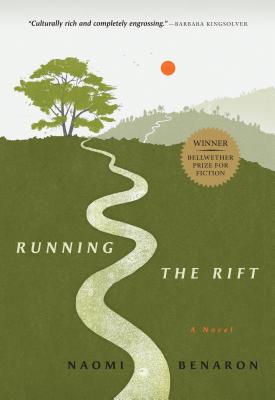Running the Rift follows Jean Patrick Nkuba, a gifted Rwandan boy, from the day he knows that running will be his life to the moment he must run to save his life, a ten-year span in which his country is undone by the Hutu-Tutsi tensions. Born a Tutsi, he is thrust into a world where it’s impossible to stay apolitical—where the man who used to sell you gifts for your family now spews hatred, where the girl who flirted with you in the lunchroom refuses to look at you, where your Hutu coach is secretly training the very soldiers who will hunt down your family. Yet in an environment increasingly restrictive for the Tutsi, he holds fast to his dream of becoming Rwanda’s first Olympic medal contender in track, a feat he believes might deliver him and his people from this violence. When the killing begins, Jean Patrick is forced to flee, leaving behind the woman, the family, and the country he loves. Finding them again is the race of his life.
Running the Rift won the 2010 Bellwether Prize, created with the mission of advocating serious literary fiction that addresses issues of social justice. Barbara Kingsolver, the founder of the Bellwether Prize, called this book "culturally rich and completely engrossing. It engages the reader with complex political questions about ethnic animosity in Rwanda and so many other issues relevant to North American readers," For one, it conveys the impossibility of remaining neutral within a climate of broad moral compromise—even for purportedly apolitical institutions like the Olympics.”
Joel says:
'To put it simply, Running the Rift is one of the most riveting, unforgettable books that I have ever read. While the plot develops slowly, it progresses to an immensely captivating, shocking, and awe-inspiring apex as it nears its end, full of love, horror, hope, and sadness—in a word: bittersweet. It is centered on the fictional life of Jean Patrick, a gifted runner full of bounding enthusiasm, extraordinary intelligence and naïve innocence. Jean Patrick lives in a Rwanda on the verge of civil war, rife with racial tension between the country’s two main ethnic groups, Hutus and Tutsis. Born a Tutsi under Hutu rule, Jean Patrick’s only chance for social and economic mobility is to perform at the very top of his class and receive extraordinary marks on standardized tests—which he does. But when Hutu-Tutsi tensions escalate throughout the novel, his extraordinary intelligence and athleticism may no longer be adequate to redeem him in the eyes of Rwandan authorities.
In Running the Rift, Jean Patrick attends a school in Burundi as he trains for the Olympics as a track runner. As Rwandan politicians turn Jean Patrick into a poster child of Tutsi success as a façade to placate the human rights demands of Western nations that provide humanitarian aid for Rwanda, Jean Patrick strives to ignore the politics and simply focus on running. He soon learns, however, that it is impossible to remain apolitical when he is running as an Olympian for his country. When Hutu President Habyarimana is assassinated and Hutus respond with a much-anticipated Tutsi genocide, Jean Patrick is forced to run for his life as he flees his homeland, with hope as his only sustenance for both his own life and the lives of those whom he loves.
Naomi Benaron has crafted a beautiful, riveting work of historical fiction that simultaneously warns us of the dangers of passively allowing societal discontent to fester and reminds us not to take for granted our most prized passions and human bonds. This captivating novel also raises difficult and compelling questions for the privileged Western reader, particularly with respect to the rightful place of humanitarian aid in foreign policy. Benaron’s writing—full of meticulous care, childlike innocence, and an enrapturing buildup to the novel’s end—powerfully paints the passion and naiveté of Jean Patrick’s lovable, noble character on every single page of this amazing book."

No comments:
Post a Comment